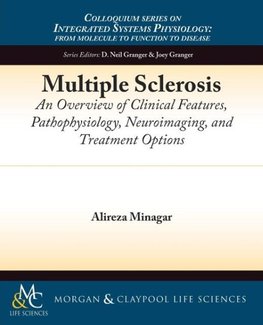
-
 Anglický jazyk
Anglický jazyk
Multiple Sclerosis
Autor: Alireza Minagar
Multiple sclerosis [MS] is one of the most common auto-immune-mediated diseases of the human central nervous system [CNS] which affects young adults and usually causes significant neurological disability. Currently, the causes of MS are still unclear, a... Viac o knihe
Na objednávku, dodanie 2-4 týždne
70.66 €
bežná cena: 80.30 €
O knihe
Multiple sclerosis [MS] is one of the most common auto-immune-mediated diseases of the human central nervous system [CNS] which affects young adults and usually causes significant neurological disability. Currently, the causes of MS are still unclear, a cure for MS remains elusive and the effectiveness of treatment varies significantly among individuals. Clinical features and neurological deficits stemming from this progressive neurological disease are diverse since MS potentially affects human CNS at all levels from brain to the end of spinal cord. The triggering event for development of MS remains unknown. Immunopathogenesis of MS involves a number of steps which include activation of peripheral leukocytes against putative CNS antigen(s), interactions of the activated leukocytes with inflamed cerebral endothelial cells, transendothelial migration of activated lymphocytes and macrophages to the CNS milieu, and further propagation of the massive immune response within the CNS. Such massive immune activation leads to loss of myelin-oligodendrocyte complex. Several immune cell types and mediators of the immune-inflammatory response actively contribute to pathogenesis of MS. Genetic factors are also believed to play a central role in the development of most forms of MS. Another important but much unrecognized and under-researched feature of MS immunopathology is "neurodegeneration." Neuronal loss and axonal degeneration are the core components of irreversible and permanent CNS atrophy and disability in MS. What we call MS in reality is a heterogeneous group of diseases and at least four distinct immunopathological subtypes of MS with dissimilar responses to therapy with immunomodulatory agents exist. MS is a clinical diagnosis, however, its diagnostic process is much facilitated by utilization of laboratory and neuroimaging studies. Present therapies of MS are either immunomodulatory agents or immunosuppressive and mainly target the peripheral immune system with the intention to ameliorate the severity of acute relapses, decrease annual relapse rate, and improve MRI lesions. Currently, much research activity is being conducted to better understand the fundamental disease mechanisms of MS and find more effective and safer treatments for this incurable disease. This book presents an overview of MS as a disease with neuroinflammatory and neurodegenerative features and the authors discuss the most recent findings about MS and its treatment.
Table of Contents: Introduction / Clinical Features of Multiple Sclerosis / Pathophysiology of Multiple Sclerosis / Neuroimaging of Multiple Sclerosis / Diagnosis of Multiple Sclerosis / Treatment of Multiple Sclerosis / Prognosis of Multiple Sclerosis / Concluding Remarks . References
- Vydavateľstvo: Biota Publishing
- Rok vydania: 2014
- Formát: Paperback
- Rozmer: 235 x 191 mm
- Jazyk: Anglický jazyk
- ISBN: 9781615045884












